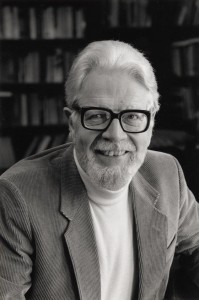 No, it’s not chlamydia. Nor is it the secret mark he made on his keys over there in the glass bowl by the front door, the one that lets you know which are his. It’s this, from his essay, “Distance and Point of View”:
No, it’s not chlamydia. Nor is it the secret mark he made on his keys over there in the glass bowl by the front door, the one that lets you know which are his. It’s this, from his essay, “Distance and Point of View”:
It is not surprising to hear practicing novelists report that they have never had help from critics about point of view. In dealing with point of view the novelist must always deal with the individual work: which particular character shall tell this particular story, or part of a story, with which precise degree of reliability, privilege, freedom to comment, and so on. Shall he be given dramatic vividness? Even if the novelist has decided on a narrator who will fit one of the critic’s classifications—”omniscient,” “first person,” “limited omniscient,” “objective,” “roving,” “effaced,” and so on—his troubles have just begun. He simply cannot find answers to his immediate, precise, practical problems by referring to statements that the “omniscient is the most flexible method,” or “the objective the most rapid or vivid,” or whatever. Even the soundest of generalizations at this level will be of little use to him in his page-by-page progress through this novel. As Henry James’s detailed records show, the novelist discovers his narrative technique as he tries to achieve for his readers the potentialities of his developing idea. The majority of his choices are consequently choices of degree, not kind. To decide that your narrator shall not be omniscient decides practically nothing. The hard question is, just how inconscient shall he be? To decide that you will use first-person narration decides again almost nothing. What kind of first person? How fully characterized? How much aware of himself as a narrator? How reliable? How much confined to a realistic inference, how far privileged to go beyond realism? At what points shall he speak truth and at what points utter no judgment or even utter falsehood? (Emphasis Booth’s; boldface mine.)
It’s an essay that argues not for bromides and easy givens about first-person and third-person narrators, but rather an understanding of the difference between dramatized and nondramatized narrators, and the options each provides their writers. I’m enamored with it right now.
What I get out of it: the only way to learn how to write really well is to write continually and write continually poorly—all the while reading from every known century until your eyes fall out. Yes!